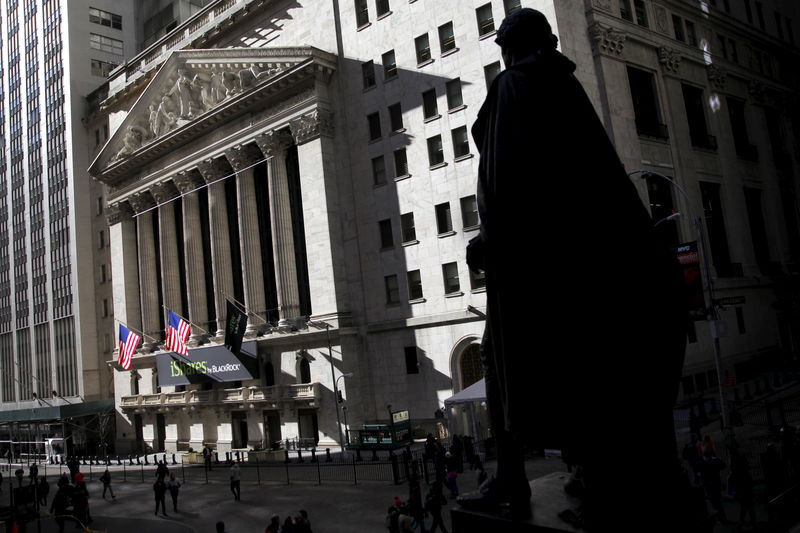Investing.com -- U.S. stock futures pointed to a mixed open for equities on Wall Street, as investors examine how recent services sector data and a closely-watched Federal Reserve survey could impact the central bank's monetary policy. Elsewhere, China's exports contract in August in a sign of mounting pressure on the manufacturing industry in the world's second biggest economy, while a report that Beijing is barring government officials from using iPhones at work weighed on Apple (NASDAQ:AAPL) shares.
1. Futures mixed following Wednesday slide
U.S. stock futures were mixed on Thursday after stronger-than-anticipated U.S. services sector data sent Treasury yields higher and weighed on equities in the prior session.
At 05:40 ET (09:40 GMT), the Dow futures contract added 41 points or 0.1%, the S&P 500 contract lost 9 points or 0.2%, and Nasdaq 100 futures dipped by 87 points or 0.6%.
Monthly data from the Institute for Supply Management (ISM) on Wednesday showed that activity in the U.S. services industry -- which makes up more than two-thirds of the American economy -- unexpectedly accelerated in August, hitting a six-month high. Input costs paid by these businesses also rose.
The numbers suggested that consumer demand is shrugging off a recent spike in interest rates -- a resilience that analysts at ING posited could be linked to a summer of popular concerts and movies. After the release of the figures, yields in both two- and ten-year U.S. government bonds climbed, while all three of the major indices on Wall Street declined.
2. Fed survey points to modest economic growth
The services data fueled some bets that the Federal Reserve may choose to hike interest rates later this year to stamp out the stubborn final embers of last year's surge in price gains.
According to Investing.com's Fed Rate Monitor Tool, the probability that America's central bank will choose to raise rates at its November meeting now stands at 43.6%, up from 39.3% in the prior day.
Investors, however, are still largely pricing in the chance that the Fed will keep borrowing costs steady at a range of 5.25% to 5.50% for the remainder of 2023. The predictions were largely supported by a Fed survey on Wednesday that pointed to modest growth and cooling inflation in the world's biggest economy in July and August.
The so-called "Beige Book" summary bolstered expectations that, even accounting for the expanding services industry, Fed policymakers were either done or wrapping up their long-standing tightening campaign.
More clues about the path ahead for rates may come on Thursday from a fintech conference where a number of Fed officials are due to speak.
3. Crude slips on weak Chinese trade data
Oil prices fell Thursday, climbing down from 10-month peaks as more signs of slowing Chinese growth overshadowed another draw in U.S. inventories that hinted at tightening supplies.
Weak trade figures out of China were seen as a signal that the world's largest crude importer is at risk of missing Beijing's annual growth target of about 5% (see below).
Meanwhile, data released late Wednesday by the industry body American Petroleum Institute showed U.S. crude inventories fell for a fourth straight week, dropping 5.5 million barrels in the week ending Sept. 1. The reading usually acts as a precursor to inventory data from the Energy Information Administration, which is due later in the day.
By 05:40 ET, the U.S. crude futures traded 0.8% lower at $86.83 a barrel, while the Brent contract dropped 0.8% to $89.92.
4. Chinese exports slump
China's exports dropped by 8.8% annually in August, while imports contracted by 7.3%, in a fresh sign of the significant pressure on the country's crucial manufacturing sector.
Although the trade numbers on Thursday topped estimates, they still indicate that government policymakers may need to do more to help shore up China's sputtering post-pandemic recovery.
Along with flagging exports, China's economy has been hit by a liquidity crisis in its property sector. Officials in Beijing have rolled out a series of smaller measures aimed at buttressing growth, but have yet to launch a wide-scale stimulus program.
Yet the woes were not confined to Asia. Industrial production in Germany fell by more than anticipated in July, exacerbating concerns that the eurozone's largest economy and major regional growth driver may be about to slip back into recession.
5. China bars government officials from using iPhones at work - WSJ
Shares in Apple decreased by just under 3.6% on Wednesday after the Wall Street Journal reported that China has banned government officials from using the tech giant's popular iPhone and other foreign-branded devices for work.
Citing unnamed people familiar with the matter, the paper said the order, which also prohibits government workers from bringing these smartphones into the office, had been handed down in recent weeks. It was not immediately clear how widely the directives were being distributed, the WSJ noted.
Traders seemingly took the report as a potential indication that China may be willing to reduce its reliance on American companies in its bid to boost domestic players. This could prove to be a blow to Apple's business in China, which generates almost a fifth of the firm's total revenue.
